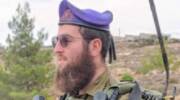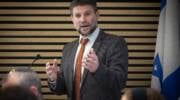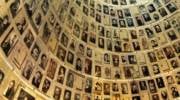A national unity initiative in memory of Gilad, Eyal and Naftali was launched Thursday at the President’s residence in Jerusalem. There is no theme better suited to their personalities, say those who knew them.
By Atara Beck
“Just as we became one in the efforts to bring them home, so too we were shaken as one when we discovered their fate,” President Reuven Rivlin declared Thursday morning at the launch of the Jerusalem Unity Prize in memory of the three Israeli youths who were abducted and murdered by Hamas terrorists last summer.
After an intense search, the bodies of Gilad Shaar, Naftali Frankel and Eyal Yifrach were found buried in a field north of Hebron. It was concluded that they were killed shortly after the abduction.
There was, however, a silver lining to the profound tragedy – the deep unity that enveloped the nation both throughout the search and upon receiving the terrible news that they had been killed.
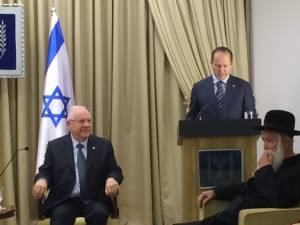
Mayor Nir Barkat addresses the audience. Left: President Reuven Rivlin. Right: Rabbi Y.D. Grossman, a major unifying force across the social spectrum. (Photo: UWI)
“Different opinions and views [and] individual interests were put aside as everyone joined in…working together with the understanding that Naftali, Gilad and Eyal were all of our sons,” the president declared at the ceremony, which took place at his residence in the presence of Jerusalem Mayor Nir Barkat and the parents of the three boys.
“We know that this great spirit of mutual responsibility is no passing phase,” Rivlin continued.
“In awarding this prize, we want to embolden and amplify the positive voices in our society and focus on the good,” he explained.
The Jerusalem Prize was initiated in partnership with the three bereaved families and the Jerusalem-based Gesher organization, a non-profit dedicated to closing the social gaps between different segments of Israeli society.
The award will be presented on June 3 in three separate categories, each with prizes of up to NIS 100,000. The first will go to an individual or organization; the second, for social initiatives to advance national unity, and the third for promoting unity between Israel and the Diaspora.
‘We Received Strength from Across the Nation’
“During the days of the search, of despair, doubts and worry, days full of holiness, we saw mutual support, caring, encouragement, and goodwill,” Avi Frankel, father of Naftali, told the assembled. “We received strength from across the nation, at home and abroad. We felt we were not alone, and that all the people stood with us through this awful time.”
“We are here to preserve the spirit of those days,” he said. “We are honored to be here to launch the prize.”
Uri Yifrach, father of Eyal, said that the boys “brought a different spirit to the people. I have no doubt that their souls have led us to a different place.”
Ofir Shaar, father of Gilad, affirmed: “This is a living memorial. It is special and vibrant, and relates to all communities and to all people in order to inspire a spirit of unity…. This is the essence of the award.”
‘Exceptional Unifying Power of the Families’
Barkat declared that “there was not a single person who was unmoved by the exceptional unifying power of the families of the three boys. The warm connection built during the week of mourning led us to create the Jerusalem Prize for Unity in Israel, which we are launching today.”
Rachel Frankel, mother of Naftali, told United with Israel (UWI) that the purpose is “to continue the spirit of the summer in the good sense. It was a terrible tragedy, but there were also good things.”
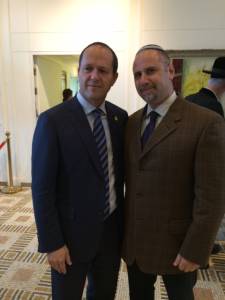
Jerusalem Mayor Nir Barkat (L) with David Zeit, executive director, United with Israel. (Photo: UWI)
The entries “should be anything to promote being connected,” she explained. “For instance, we are experiencing an election. There are different opinions, which is wonderful, but we need to respect each other, to converse.
“People felt connected, like one extended family,” she continued. “We [the families] felt it for sure, even from people abroad, not only those in Israel.”
Iris Yifrach, mother of Eyal, told UWI: “My son was very interested in this type of initiative. In Grade 12, he left his regular high school and went to study in Bat Yam [city near Tel Aviv]. He dedicated his year to working with different types of people – disabled, new immigrants,” and others from all walks of life. “He left his familiar surroundings and reached out.”
Rabbi Yitzchak Dovid Grossman, founder and dean of Migdal Ohr educational institutions and a member of the Chief Rabbinate Council of Israel, is well known for his work with children from disadvantaged and troubled homes. A major unifying force among various communities, he has rehabilitated tens of thousands of youth through his educational network.
“Gilad [Shaar], before he became a Bar Mitzvah, wanted to visit me and learn about the meaning of Ahavat Yisrael – loving your neighbor as thyself,” the rabbi told UWI. “He would ask: What can I do to contribute?”
“There can be no better remembrance for their souls,” he said. This is exactly what the nation of Israel and the people of Israel need.”
Do You Love Israel? Make a Donation - Show Your Support!
Donate to vital charities that help protect Israeli citizens and inspire millions around the world to support Israel too!
Now more than ever, Israel needs your help to fight and win the war -- including on the battlefield of public opinion.
Antisemitism, anti-Israel bias and boycotts are out of control. Israel's enemies are inciting terror and violence against innocent Israelis and Jews around the world. Help us fight back!


